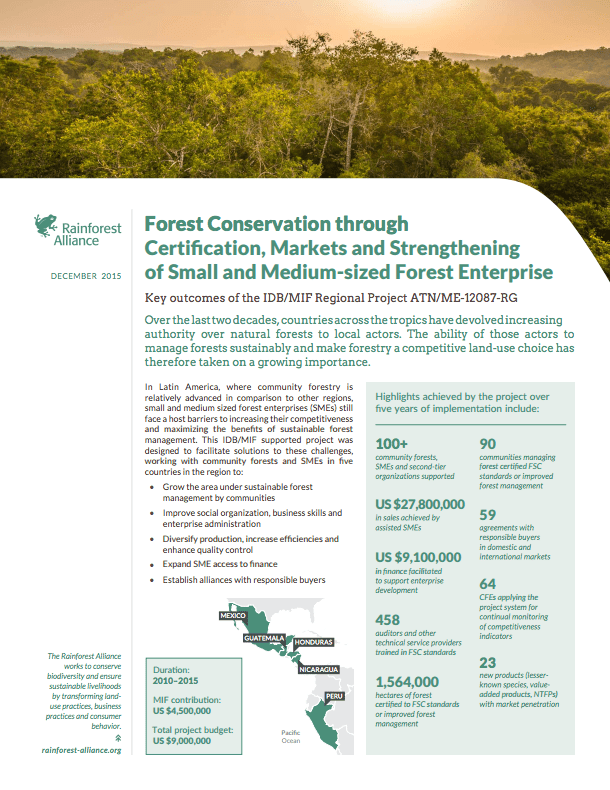Community Forest Enterprise Development: Case Studies from Latin America
Over the last two decades, countries across the tropics have devolved increasing authority over natural forests to local actors. While decentralizing control over natural forests is a step in the right direction, it is also clear that community forests can actually face increased pressure for conversion once they’re handed over. In this context, the capacity of communities to manage forests sustainably and make forestry a competitive land-use choice has taken on greater importance.
The Rainforest Alliance supports community forest enterprises (CFEs) around the globe to improve forestry operations, organize socially-equitable enterprises, and achieve greater competitiveness. With support from the Multilateral Investment Fund (MIF) of the Inter-American Development Bank (IDB), we have produced a series of ten case studies profiling the results of our work with CFEs in the Latin America region. Case studies were carefully selected to cover all five countries where the MIF project operated (Guatemala, Honduras, Mexico, Nicaragua, and Peru), and to reflect the full range of participants—from highly incipient community operations to second-tier business alliances among multiple well-developed, certified enterprises. Special attention was also paid to ensuring representation among forest ecosystems (temperate and tropical), tenure arrangement (permanent and concession) and production focus (timber and non-timber).
Taken together, the ten studies support the growing body of evidence demonstrating that community-based production forestry can be an effective approach to conserving forest resources while also generating significant social and economic benefits for marginalized communities.
| No. | Case Study | Location |
|---|---|---|
| 1 | Awas Tingni indigenous Mayangna community | North Atlantic Autonomous Region, Nicaragua |
| 2 | Moskibatana non-timber forest product enterprise | Muskitia, Honduras |
| 3 | Ejido El Largo | Chihuahua, Mexico |
| 4 | CAIFUL agroforestry cooperative | Río Plátano Biosphere Reserve, Honduras |
| 5 | Forest management in community concessions | Maya Biosphere Reserve, Guatemala |
| 6 | Brazil nut production and enterprise | Madre de Dios, Peru |
| 7 | TIP Muebles | Oaxaca, Mexico |
| 8 | Tres Islas native community | Madre de Dios, Peru |
| 9 | Building markets for lesser-known species | Maya Biosphere Reserve, Guatemala |
| 10 | Financial mechanisms for community forests | Maya Biosphere Reserve, Guatemala |
